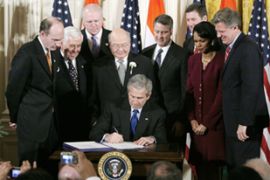Bush signs India nuclear bill
At White House ceremony, the president describes US and India as “natural partners”.

‘Natural partners’
Bush said: “The United States and India are natural partners, the rivalries that once kept our nations apart are no more.“
Manmohan Singh, the Indian prime minister, defended the nuclear deal, rejecting opposition criticism that it would lead to the dismantling of India’s atomic weapons.
He said he had some concerns about the legislation, but that they would be dealt with during technical negotiations on an overall US-India cooperation agreement.
Singh said India would not accept new conditions and its nuclear weapons programme would not be subject to interference of any kind because the agreement with the US dealt only with civil nuclear co-operation.
Earlier, LK Advani, the leader of the opposition Bharatiya Janata Party, said India should not accept US legislation, saying that the deal would prevent India from conducting nuclear tests in the future.
India conducted its first nuclear test in 1974 and followed it up with a series of others in 1998.
Advani said: “The primary objective is to cap, roll back and ultimately eliminate its [India’s] nuclear weapons capability.”
Hurdles
Several hurdles remain before civil nuclear trade between the two countries can begin.
US and Indian officials need to work out a separate technical nuclear co-operation agreement, expected to be finished next year.
The two countries must now obtain an exception for India in the rules of the Nuclear Suppliers Group, an assembly of nations that export nuclear material.
India and the International Atomic Energy Agency must also agree on an inspection plan.
Experts say India has already produced about 50 nuclear weapons and plans to reach up to 400 in a decade.